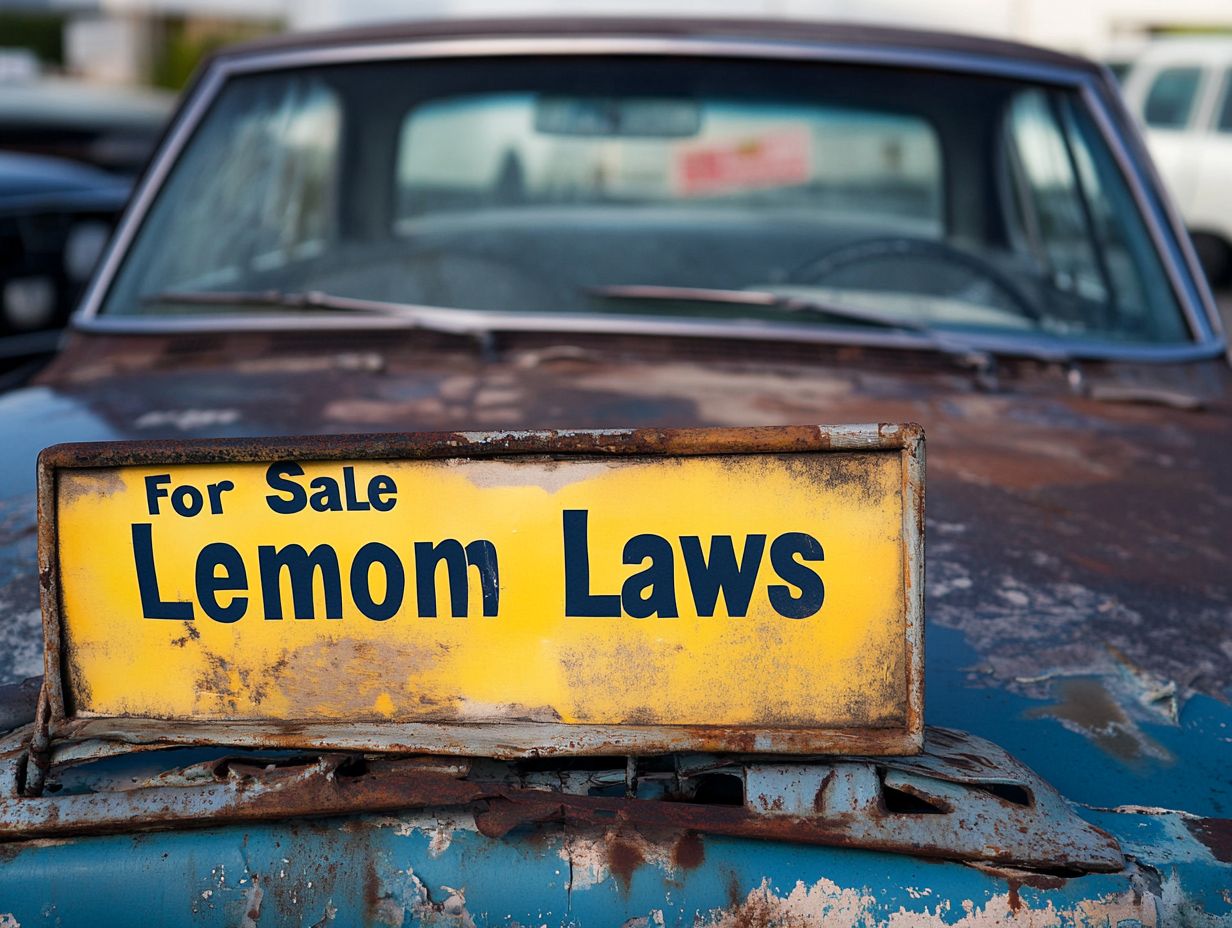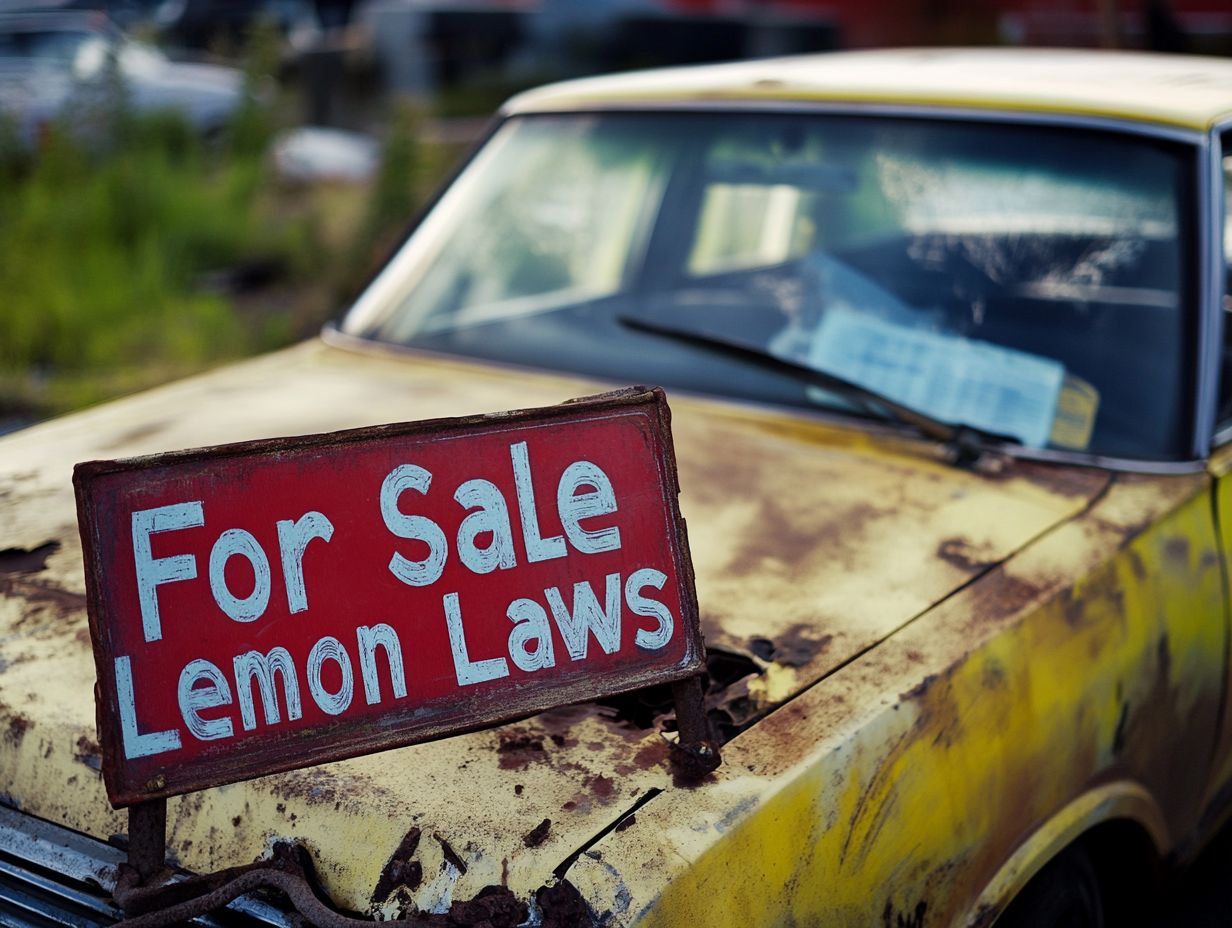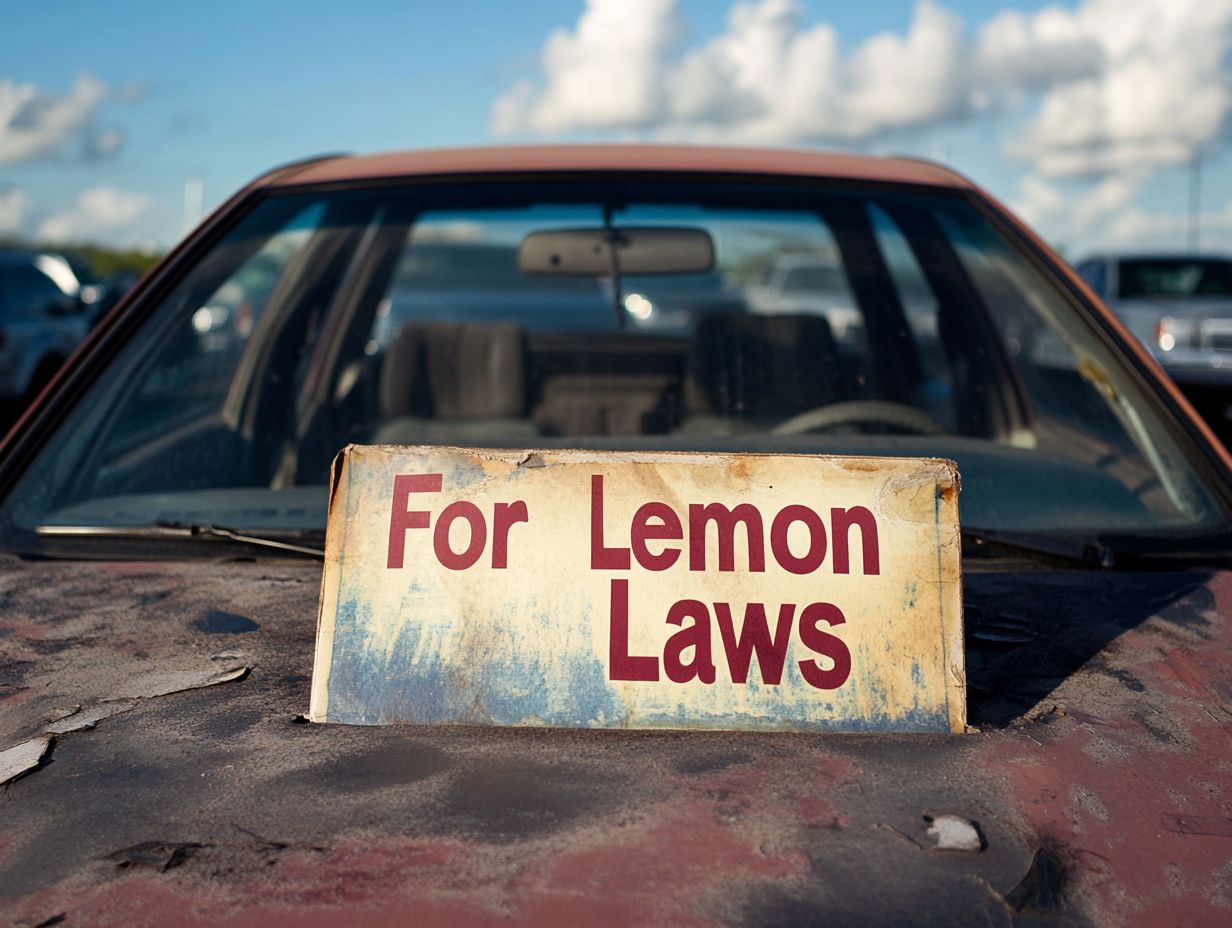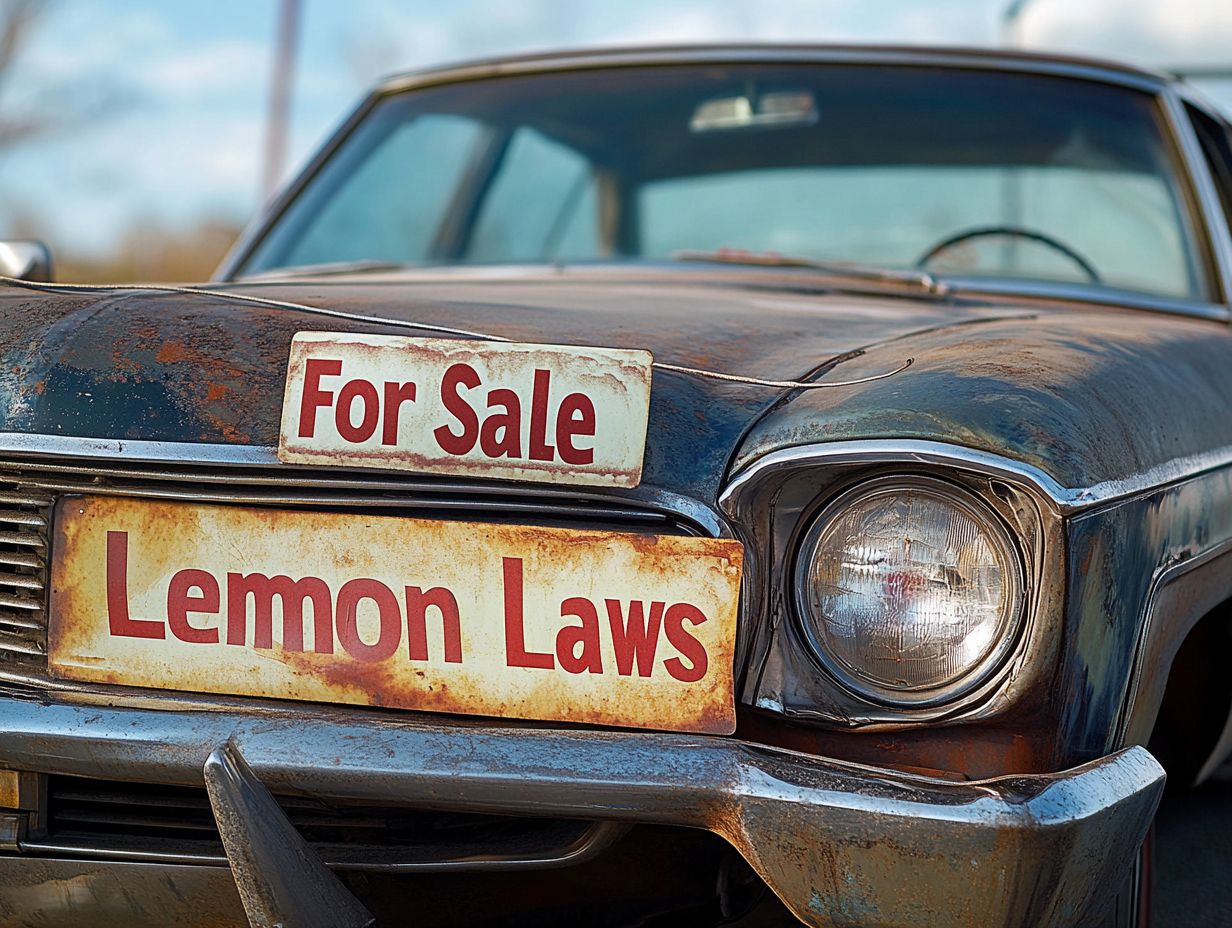What to Know About Lemon Laws in Used Cars
Navigating the world of used cars can often feel like stepping into a high-stakes game. Unexpected issues can come knocking at your door. Lemon laws exist to safeguard you from defective vehicles, ensuring you re not left holding the short end of the stick.
Let s dive into the key points of lemon laws. This article covers their definition, state-specific variations, and the criteria you need to meet to qualify for protection.
If you find yourself stuck with a lemon, this article will walk you through the necessary steps and explore alternatives if you wish to negotiate directly with your dealer.
Prepare to equip yourself with the knowledge needed to confidently address any lemon car situation that may come your way!
Contents
Key Takeaways:

Lemon laws protect consumers from faulty cars, providing refunds or replacements. Know your state’s specific laws to claim your rights effectively.
Understanding Lemon Laws
Lemon laws are vital consumer protection regulations. They are designed to protect you from buying defective cars, especially in states like California.
These laws create a framework that allows you to pursue financial compensation for the headaches caused by such purchases. Their primary goal is to prevent you from being stuck with a lemon, a term that refers to vehicles that fall short of quality and performance expectations.
This overview explores the definition and purpose of lemon laws, along with their implications for consumers, manufacturers, and auto dealers alike.
Definition and Purpose
The term “lemon law” refers to laws designed to protect consumers from faulty vehicles. These vehicles consistently fail to meet quality and performance expectations.
Lemon laws emerged in the United States during the late 20th century, born out of consumer frustration with unreliable cars and the often difficult process of securing fair remedies from manufacturers.
Lemon laws enable you to seek recourse for vehicles that don t deliver on their promises commonly known as “lemons.” If your vehicle requires repeated repairs for the same problem or has significant defects that compromise safety or usability, you have the right to pursue a refund or a replacement vehicle.
Warranties are crucial in this equation as they outline the responsibilities of manufacturers to rectify flaws, ensuring you possess enforceable rights and protections within the marketplace.
Which States Have Lemon Laws?
Lemon laws differ considerably throughout the United States.
In states such as California and New York, strong protections are in place for consumers facing ongoing problems with defective vehicles.
Conversely, other states may have varying requirements under their specific laws or local regulations. It is essential for you to familiarize yourself with the laws applicable in your area.
State-Specific Laws and Variations

State-specific lemon laws vary dramatically, shaping how you navigate your rights and protections when dealing with defective automobiles.
Take California, for example. Here, the lemon law covers both new and used vehicles still under warranty. It’s important to be informed about what to know about used car recalls, as manufacturers must replace or refund cars with significant defects that compromise their use, safety, or value.
You need to report any issues within a specific timeframe usually 18,000 miles or 18 months, whichever occurs first.
On the other hand, New York’s regulations offer protections for new vehicle buyers, but your eligibility often depends on whether the manufacturer has made several unsuccessful repair attempts.
These differences in legal standards can greatly impact your experience with the claims process, leading to varied outcomes and levels of consumer satisfaction based on the regulations in your state.
Are You Eligible for Lemon Law Protection? Find Out!
To qualify for lemon law protection, you need to meet specific eligibility criteria. This usually involves demonstrating that your vehicle is indeed defective and that you’ve made a reasonable number of attempts to get it repaired without success.
It s crucial to keep detailed records of your repair history throughout this process.
If you think you have a lemon, act fast! Knowing your rights can save you time and money.
Requirements and Criteria
The requirements for filing a lemon law claim typically demand that you provide clear evidence of mechanical failures, defects, and a reasonable number of unsuccessful repair attempts.
Beyond this essential proof, it’s crucial for you to gather and present all relevant documentation. This includes:
- Repair records
- Service invoices
- Any correspondence with dealerships or manufacturers
These documents are vital. They act as solid evidence to illustrate the ongoing issues and the efforts you have made to resolve them.
Following the outlined process is key; this usually involves notifying the manufacturer of the defects and giving them one last chance to repair the vehicle.
Adhering to these steps ensures that your claim is processed smoothly. Neglecting to follow the prescribed procedure can endanger the success of your claim and complicate the resolution process.
Steps to Take if You Have a Lemon Car
Should you find yourself in possession of a lemon car, it s essential to take a few thoughtful steps.
- Start by carefully keeping track of all your repair attempts.
- Next, reach out to the dealer to seek a resolution.
- If those efforts prove fruitless, you may need to consider filing a lemon law claim to pursue financial compensation for your defective vehicle.
How to File a Claim and Seek Compensation

Filing a lemon law claim requires a carefully structured approach. You ll need to gather essential documentation detailing your vehicle’s defects, any repair attempts you have made, and all correspondence with the dealer to support your case. This is your ticket to potentially engaging in meetings where both parties try to resolve the issue with a neutral third party.
The significance of this documentation cannot be emphasized enough; it s the bedrock of your claim. Typically, you ll need to present repair invoices, warranty information, and all records of communication with the manufacturer or dealer.
Expect this process to take anywhere from a few weeks to several months, depending on the particulars of your case and how promptly the manufacturer responds. In certain scenarios, the law may provide arbitration programs as alternative dispute resolution methods, which can streamline the outcome.
Understanding your rights as a consumer is vital in this journey. By being well-informed, you will be better equipped to navigate any disputes and work towards a favorable resolution.
Alternatives to Lemon Law Claims
Before you dive into lemon law claims, it may be worth considering alternatives like negotiating directly with the dealer or manufacturer. This approach can often lead to satisfactory resolutions without the hassle of legal proceedings.
Negotiating with the Dealer or Manufacturer
Negotiating with the dealer or manufacturer is a crucial step where you can articulate your concerns and seek financial compensation or vehicle replacements without having to resort to lemon law claims.
Approaching these discussions with a strategic mindset is essential. Employing effective negotiation strategies can greatly enhance your chances of achieving a favorable outcome.
For instance, gather and present clear evidence, such as repair records and communication logs, which can substantiate your claims and highlight the challenges you have faced. Maintaining transparency throughout the process fosters trust and encourages cooperation, leading to more productive discussions.
Ultimately, if you succeed in these negotiations, you stand to gain significant benefits such as refunds, extended warranties, or even replacements, helping to alleviate the stress that comes with owning a problematic vehicle.
Frequently Asked Questions
What to Know About Lemon Laws in Used Cars?

Lemon laws are state-specific laws that protect consumers from purchasing defective vehicles, also known as “lemons.” These laws typically apply to both new and used cars, but the specific requirements and protections may vary by state.
Don t wait start documenting your issues today!
What qualifies as a “lemon” under lemon laws?
A vehicle is a “lemon” if it has a major defect that affects its use, value, or safety. If the defect can t be fixed after several attempts, it qualifies.
Requirements may differ by state, but generally, the defect must be covered by the manufacturer s warranty.
Do lemon laws apply to all used cars?
No, lemon laws usually apply only to used cars still under warranty. If the warranty has expired, protections may not apply.
What should I do if I think I purchased a lemon?
If you think your used car is a lemon, document all repairs. Then, contact the manufacturer or dealership to resolve the issue.
If the problem remains unresolved, you may need to take legal action or file a complaint with your state s attorney general or consumer protection agency.
Are there any time limits for filing a lemon law claim?
Yes, most states have a deadline for filing a lemon law claim. You must file within a specified time after noticing the defect or before the warranty runs out.
Check your state’s specific deadlines and act quickly if you believe you have a lemon.
Can I receive a refund or replacement under lemon laws?
If your vehicle qualifies as a lemon and meets all necessary requirements, you may get a refund or a replacement vehicle from the manufacturer.
Requirements for these remedies can vary by state, so consult a lawyer or your state s consumer protection agency for advice.






